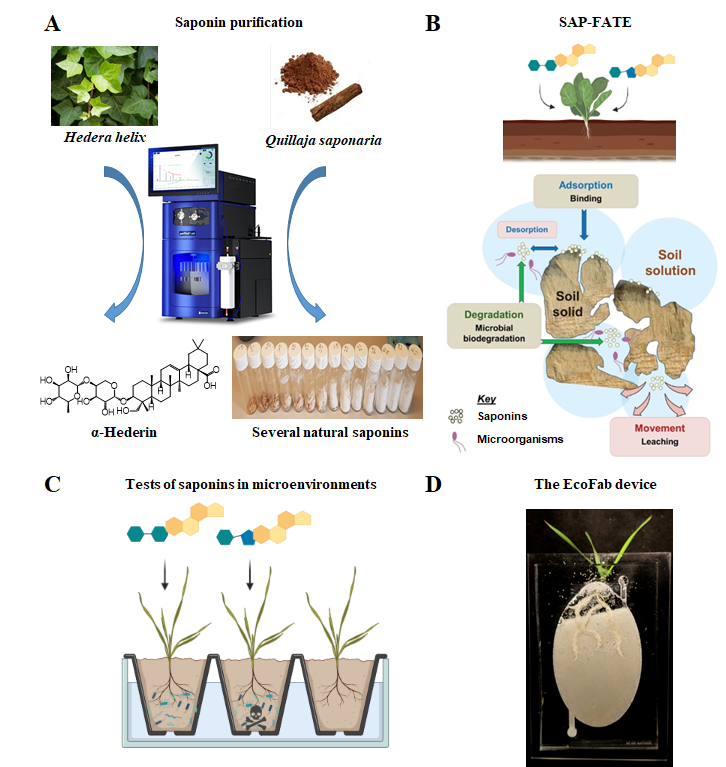SAP-FATE: Saponins for sustainable agriculture - Fate, biological activity and environmental impact of saponins in soils
In SAP-FATE we aim to understand the properties, stability, activity and transformation of saponins in soil, and evaluate how saponins of known chemical structures affect soil microbial communities. SAP-FATE will provide answers that are pivotal for evaluation of the potential of saponins as future biopesticides and for their risk assessment.

Plant specialized metabolites have an untapped potential as biopesticides and can become part of the solution to secure sustainable food production and increase agricultural resilience. Saponins are one such class of plant specialized metabolites that work against above-ground insect herbivore pests. However, we know surprisingly little about what happens below-ground when they are introduced in agricultural pest management. In SAP-FATE we aim to understand the properties, stability, activity and transformation of saponins in soil, and evaluate how saponins of known chemical structures affect soil microbial communities. SAP-FATE will provide answers that are pivotal for evaluation of the potential of saponins as future biopesticides and for their risk assessment. The three researchers (Søren Bak, Mette Haubjerg Nicolaisen, and Hans Christian Bruun Hansen) bring the necessary and complementary competencies within plant specialized metabolites, soil environmental chemistry, and soil microbiota to achieve the ambitious aims. The project consists of three elements that comprise purification and isotopic labelling of saponins for fate studies, saponin mobility and degradation in soils, and their impact on microbial community structures and effects on element cycling.
Many of the new high protein crops to be introduced as part of the transition to a greener diet naturally contain saponins that inevitably will end up in the environment. We do not know if saponins will be released to the belowground from these plants. Therefore, SAP-FATE will also analyze the content, structural complexity and their ability for exudation to the soil.
SAP-FATE has a focus on saponins, but the knowledge gained and technologies implemented can directly be transferred to other classes of plant specialized metabolites and biopesticides. SAP-FATE is at the very forefront of the Green Transition agenda, and will contribute to positioning plant specialized metabolites as a logical approach to support to support productivity and resilience of agricultural production systems.
SPECIFIC AIMS
We must make agriculture more sustainable, productive, resilient and at the same time more environmentally friendly. Plant specialized metabolites like triterpenoid saponins can be part of this solution – but we need to understand their fate and environmental impact before we can unleash their potential.
In SAP-FATE we aim to understand the properties, stability and transformation of saponins in soil and evaluate how saponins of known chemical structures affect soil microbial communities and their responses towards saponins.
| Name | Title | Phone | |
|---|---|---|---|
| Search in Name | Search in Title | Search in Phone | |
| Chen Wang | Postdoc | +4571850792 | |
| Hans Chr. Bruun Hansen | Professor | +4535332418 | |
| Malbor Dervishi | PhD Fellow | +4535329391 | |
| Mette Haubjerg Nicolaisen | Associate Professor | +4535332649 | |
| Søren Bak | Professor | +4535333346 |
Contact
Søren Bak
Professor
bak@plen.ku.dk
+4535333346
Katja Annette Willrodt
Project Manager
kwi@plen.ku.dk
+4535325828
